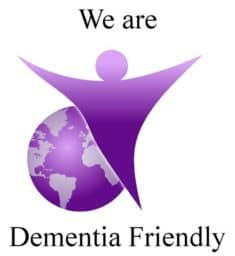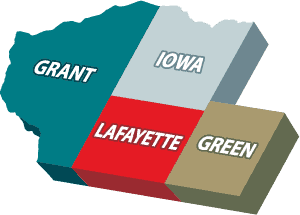Dementia Friendly Communities
You may be wondering what a Dementia Friendly Community is, this page is here to help explain that and maybe give you some opportunities to help your community become dementia friendly. Let’s start by discussing why we are working on this initiative!
Dementia in Wisconsin
Even as the number of people who will face dementia in their lives increase, the number of people who are the primary source of caregiving is decreasing.
The average age of caregivers is 49, and in 2040, the projected number of people at that age will decrease to 2.7 for every one person over the age of 80. The chances of developing dementia symptoms are one in three at age 85, it is anticipated there will be an increased demand of support for people with dementia and a shortage of family caregivers.
Dementia-friendly initiatives can provide assistance to meet the anticipated needs of individuals with dementia, their caregivers, and communities.
Impact on Caregivers
In 2013, Americans provided 17.7 billion hours of unpaid care to people with Alzheimer’s disease and other dementias. Providing care for an individual with dementia can place high demands on the caregiver’s own health and emotional well-being. Caregivers report some positive feelings, including family togetherness and the satisfaction of helping others. High levels of stress related to providing care are also reported, which can include a strain on finances and family relationships.
Caregivers can also experience depression, sleep disturbances and an impact on their physical health. As a result of the chronic stress, physiological changes can occur including high levels of stress hormones, reduced immune function, and slow wound healing. All of which can result in an increased use of health care by caregivers.
Dementia Friendly Communities
A dementia-friendly community is a place where individuals with dementia:
- +Are able to live good lives.
- +Have the ability to live as independently as possible.
- +Continue to be part of their communities.
- +Are met with understanding.
- +Are given support where necessary.
According to Innovations in Dementia (2012), individuals with dementia described a dementia-friendly community as one that enabled them to:
- +Find their way around and be safe
- +Access local facilities they are used to and where they are known (banks, shops, cafes, cinemas, and post offices).
- +Maintain their social networks so they feel they continue to belong.
Dementia-friendly communities build infrastructure to support and take responsibility for enlarging the beneficial effect of services for individuals with dementia and their caregivers. To accomplish these goals, communities can develop new models of collaborative service delivery and advocacy.
Areas of need to be addressed include:
- +Public awareness
- +Promotion of early detection
- +Creation of environments that calm and support the reduction of anxiety for those with dementia
- +Crisis capacity for mobile crisis teams
- +Development of emergency placement facilities
- +Successful care transition managemtne between settings
- +Voluntary sheriff registry and wandering programs
- +Dementia friendly businesses
Enhancing hospitality and positive experiences for customers and employees can be considered good business practices, including respectful and responsive services for individuals with Alzheimer’s disease and other dementias and their caregivers. A business that is dementia-friendly becomes a stakeholder in the well-being of the community.
As there is a financial cost for a business to have its employees engaged in activities other than their normal work functions, it is critical that dementia-friendly business training be conducted in a manner that consider the business’s schedule, timing and distinct needs. Initial training can raise awareness and is usually implemented in 30 minutes or less, allowing for questions and time to discuss specific issues relevant to an individual business.
Why is it important for businesses to be dementia-friendly?
- +They may have customers with dementia or customers who are caregivers of individuals with dementia.
- +They may have employees in the beginning stages of dementia or that are caregivers for individuals with dementia.
A dementia-friendly business is a business that,
- +Is able to recognize the signs of dementia.
- +Can communicate effectively with individuals with dementia.
- +Knows how to locate resources and assistance for themselves and for individuals with dementia.
Trained Dementia Friendly Businesses/Organizations:
Businesses and Organizations that have been trained are able to display the purple angel which is a worldwide symbol for being dementia friendly.
[column]
Grant County
- Academy Apartment Managers, Sinsinawa Mound
- ADRC Volunteer Drivers
- Old National Bank-Platteville
- City of Platteville
- Country Club Townhouses
- GIL Shopping News – Platteville
- Grant County Health Department
- Jayne’s Family Hair Care
- Jenor Towers
- Karrmann Law Office
- Meal Site Coordinators
- Mound City Bank-All Locations
- Park Place*
- Platteville Police Department
- Platteville Public Library
- Platteville Senior Center
- Richard Financial Resources
- Rotary Club-SW WI
- Sinsinawa Support Staff
- Southwest Health EMS
- Tennyson/Potosi Community Bank
- Walgreens-Platteville
Green County
- Albany EMS
- Behring Senior Center
- Brodhead Optimists
- Culver’s of Monroe
- Ekum Abstract and Title
- Green County Health Department
- Kiwanis Club of Monroe
- Maple Leaf-New Glarus
- Monroe Public Library
- Monroe United Methodist Church
- Morning Optimist Club
- Paul Mitchell The School
- Union Presbyterian Church-Monroe
- United Chiropractic-Brodhead
- Walgreens-Monroe
- Wisconsin Bank & Trust-Monroe
- Woodford State Bank
[/column]
Iowa County
- ADRC Volunteer Drivers
- Anchor Bank-Dodgeville
- Berget Jewelers
- Bunbury & Associates Realtors
- Care Wisconsin
- Country View Veterinary Clinic
- Culver’s of Dodgeville
- Davis Duehr Dean
- Dodgeville Public Library
- Dodgeville Veterinary Service
- Iowa County Health & Human Services
- Iowa County Sheriff’s Department
- Mineral Point Police Department
- Piggly Wiggly-In Progress
- Southwest Dental Associates
- St. Joseph’s Catholic Church
- St. Mary’s/Paul’s Catholic Church
- Walgreens-Dodgeville
- Worksite Solutions-Dodgeville
Lafayette County
- Avon Locker Plant
- American Family Insurance-Shullsburg
- Benton State Bank
- Black’s Floor CoveringThe Coffee Cup
- Darlington City Office
- Darlington Police Department
- Edward Jones-Office of Financial Advisor, Brad Mootz
- First National Bank- Gratiot & Darlington
- Heart of Healing-Karin Lutes, L.Ac.
- JACE Boutique
- John & Deb’s Place
- Johnson Public Library
- Kingsley Crossing
- Lafayette Area EMS
- Lafayette County Health Department
- Lafayette County Human Services
- Main Furniture & Home
- Marilyn’s
- McCoy Public Library
- Pins & Pieces Quilt Shop
- Riley Plumbing & Heating
- Shullsburg Chiropractic Office
- Shullsburg Community Bank
- StudiOlivia Photography
- Subway-Darlington
- The Burg
- US Cellular
- Whalen Chiropractic
- Woodford State Bank


